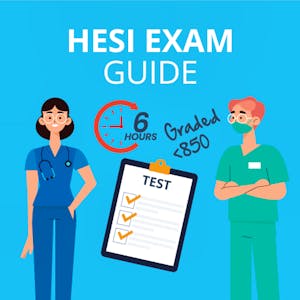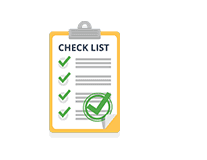HESI Exam Score Range and Passing Scores – Ultimate Guide For Nursing Students
Updated May 30, 2024


There are two types of HESI Exam:
- The Admissions (A2) test
- The Exit exam
The minimum passing score for the Admissions test is usually between 75 and 80 for each section, although this varies between schools.
The composite score range for the Admissions (A2) test is 750 to 900, with 900 being the maximum possible score.
The HESI Exit Exam score ranges between 0 to 1,500. 850 is considered to be an acceptable score, although HESI recommends a minimum score of 900.
If you want to sit your NCLEX licensing exam, you will need to achieve a score of at least 850 on the HESI Exit Exam.
HESI is an acronym for Health Education Systems Incorporated.
As a company, HESI administers exams and provides study material to help prepare students for the NCLEX professional licensure exam.
If you want to work as a nurse in the US, many nursing and healthcare programs use HESI tests to screen prospective students and determine suitability and readiness for specific study routes.
In this article, you can learn more about the HESI score ranges and passing scores required for each of these tests and what impact your HESI results may have on acceptance into your preferred nursing program.
How Is the HESI Scored?
The purpose of the HESI Admissions test is to determine whether a prospective student is suitable to join their preferred course of study.
The purpose of the HESI Exit exam is to establish the likelihood of a nursing student passing the NCLEX exam to achieve professional licensure.
In some schools, a student’s HESI Exit exam results will have a bearing on whether they will be allowed to graduate.
The HESI Admissions (A2) test covers the following topics:
- Mathematics (55 questions)
- Biology (30 questions)
- Chemistry (30 questions)
- Physics (25 questions)
- Anatomy and Physiology (30 questions)
- Grammar (50 questions)
- Vocabulary (50 questions)
- Reading Comprehension (50 questions)
Each section contains five ‘pilot’ questions, which do not have an impact on the student’s overall test results.
In many cases, students are not expected to complete all sections of the test. This will be determined by the program provider.
Students are allowed up to six hours to complete all parts of the test. Students are not penalised for giving an incorrect answer.
Some schools require students to sit the math, vocabulary, grammar and reading comprehension tests. Others also require completion of the anatomy/physiology and biology tests.
In most cases, you will only be expected to sit three to five of the HESI subtests. It is unlikely you will be required to complete the Physics and Chemistry sub-tests.
If you are not sure which tests you need to revise for, you should check with the administrator at the school you are applying for.
On the HESI Admissions test, each section is scored individually on a scale between 0 and 100. This is calculated as a percentage.
For example, in the grammar section, there are 50 questions. If a student answers 45 questions correctly, their score for that sub-section will be 90(%).
What Is a Good HESI score?
Each school sets its own 'passing' score for the test. In most schools, the minimum passing score is between 75 and 80 for each section.
What Is the HESI Score Range?
HESI A2 Exam Score Range (Known as the HESI Exam)
HESI A2 is a multiple-choice exam. It is split into nine sections and covers three academic areas.
The exam will include some or all of the following sections:
- Math
- Vocabulary and General Knowledge
- Reading
- Comprehension
- Grammar
- Chemistry
- Biology
- Anatomy and Physiology
- Physics
It also includes a separate learner profile section.
Students will receive a separate score for each section of the exam.
In addition to the individual subtest scores, students also receive a composite score for the entire exam, which is calculated using the average school for all the subtests.
Composite scores for the HESI exam usually range between 750 and 900, with 1,500 being the highest possible score.
Generally speaking, a score of 850 is considered to be the minimum acceptable score, and 900 is the passing score recommended by HESI. However, each school can set its own threshold for a passing score, so these scores are only recommendations.

If you want 12-month access to all the practice resources for this test, our partner TestPrep-Online.com offers a Family Membership.
Family Membership gives you access to all the TestPrep-Online resources for the next 12 months. You will also get two separate accounts, which can be very helpful if you have two children preparing for their tests.
HESI Exit Exam
The HESI Exit Exam for registered nurses (RN) comprises 150 questions.
The practical nursing (PN) version of the test comprises 75 questions. Candidates must answer various types of questions, including multiple-choice, data interpretation, drag-and-drop, and fill-in-the-blanks.
The HESI Exit Exam covers the following categories:
- Nursing process
- Client needs
- Specialty area
Each of the categories is split into further sub-categories.
Questions on the HESI Exit Exam are weighted, which means you will receive more ‘points’ if you give a correct answer on a more difficult question.
The scoring system used is similar to that used in the NCLEX exam.
The purpose of the HESI Exit Exam is to check whether a candidate is ready to pass the NCLEX exam. The NCLEX is the licensing exam that must be passed in order for someone to work as a nurse.
HESI Exit Exam scores fall between 0 and 1,500.
An acceptable HESI score is 850, and the recommended HESI passing score is 900.
To be considered ready to sit the NCLEX, you must achieve a score of at least 850 in the HESI Exit Exam.
Here is an overview of the HESI Exit Exam Score Ranges:
- 950 or over – Outstanding chance of passing the NCLEX
- 900–949 – Excellent chance of passing the NCLEX
- 850–899 – Average chance of performing well in the NCLEX
- 800–849 – Below average chance of performing well in the NCLEX
- 750–799 – Extra preparation required
- 700–749 – Extra preparation and study required
- 650–699 – High chance of failing the NCLEX
- 649 and below – Expected to perform poorly on the NCLEX
What Is a HESI Passing Score?
HESI passing scores depend on the school or college.
HESI is not a pass-or-fail test, which means educational institutions can set their own preferences on what constitutes a good score.
However, as outlined above, a 'good' score on the HESI A2 Admissions test is 900 or over.
A 'good' score on the HESI Exit exam is also 900 or over.
What About HESI Conversion Scores?
Schools and colleges use HESI conversion scores to interpret individual HESI test scores.
Conversion scores are calculated as a percentage. They are used by institutions to determine passing and 'good' scores.
Each school sets its own guidelines for converting raw scores into conversion scores. However, the more questions you answer correctly, the higher your overall score will be.
What If You’re Not Happy With Your HESI Exam Score?
If you are unhappy with your HESI Exam Scores, you have the option to retake the test.
You might want to consider this option if your score does not meet the minimum requirement expected by your preferred school or college.
The rules on resitting the HESI Exam vary between schools, so it is important to check with the establishment you are applying for.
Generally speaking, you can sit the HESI Exam once per 60 days, with no more than three attempts during any 12-month period. However, some schools limit attempts to two within a two-year period.
You will need to wait at least two weeks from the date of your first test before you can sit any subsequent test.
Remember, you will need to pay the associated test fee each time you take the test. This can range from $30 to $110 or more.
To stand the best chance of passing the test the first time, it is important to dedicate sufficient time to preparation and revision for the HESI test.
Completing practice tests is a great way to get started with this preparation.
How to Improve Your HESI Scores
Step 1. Completing Online Practice Tests
Working through online practice tests is one of the best ways to prepare for any test. Doing so helps you to learn what to expect from the questions on the test and highlight any areas you need to revisit as part of your revision strategy.
Completing online practice aptitude tests also helps you to improve your time management skills.
The HESI is a time-limited test, so it is important that you practice working against the clock.
Keep track of your scores so that you can monitor your ongoing progress.
You can find a range of online resources to help you, including mock numerical reasoning, inductive reasoning, logical reasoning and cognitive ability practice papers on the Practice Reasoning Tests website.
Step 2. Becoming Familiar with the Test Topics and Format
Knowing what to expect on the day of the test is vital. If you are sitting the HESI A2 Admissions test, it is important to find out what sections of the test you will be taking. After all, there is little point in revising for a subject that you will not be tested on during the exam.
Contact the administrator at your chosen school or college for more information on the test topics and format of the HESI test.
Once you know which sub-tests will be included in the test, you can focus your revision on the appropriate areas.
If you have identified weaker areas, be sure to dedicate plenty of time to them. The more you practice, the more confident you are likely to feel on the day of the test.
Step 3. Setting up a Study Schedule
Putting together a study schedule is an excellent way to manage your time in the weeks leading up to your test.
Once you have a date for the exam, start thinking about what time you have available to dedicate to studying and revision.
Look at your overall schedule and highlight any windows that you could use for studying.
Think about what time of the day you work best - some people feel more switched on in the mornings, other people prefer to work late into the evenings.
If you know other people applying for the same course, see if you can team up with them for some joint study sessions, too.
If you score 75 on a sub-test of the HESI A2 Admissions test, you have a good chance of passing that section of the test. However, this depends on your preferred school or college.
Individual educational establishments can set their own minimum requirements for HESI scores.
A passing cumulative score on HESI A2 Admissions is 850 or over.
A good score on the HESI Exit exam is 900 or over.
A score of 70 on an individual sub-test of the HESI Admissions test is considered to be below average.
75 is the average score on an individual sub-test of the HESI A2 test.
On the HESI Exit exam, 800 to 849 is considered to be an average HESI score.
On the HESI A2 Admissions test, an average score would be between 70 and 75 for an individual sub-test.
The highest HESI score possible is 1,500.
It depends on the student. If you achieve a very high score on the HESI test, you may think that the NCLEX is a more challenging test overall.
If you score within a few hundred points of passing the HESI Exit exam, you will probably think that the NCLEX is easier.
Final Thoughts
HESI exams are a useful tool for nursing schools and healthcare college programs.
The HESI A2 Admissions exam helps educators decide whether a student is suitable for admission into a healthcare learning program, whereas the HESI Exit exam helps educational establishments determine how likely a student is to pass their NCLEX licensing exam following completion of their studies.
Each school or college sets its own requirements for the minimum HESI A2 score.
Each sub-section is scored separately, using a percentage scale between 0 and 100. These percentage scores are combined to create a cumulative score.
In most cases, you must achieve a percentage score between 70 and 75% (or a cumulative score of 850 or higher) to be accepted into the nursing program.
If you are sitting the HESI Exit Exam, you must achieve a minimum score of 850 to be considered ready to sit the NCLEX.
Whichever HESI test you are sitting, preparation is vital. This might include revising weaker topic areas, completing practice tests and working alongside your peers to boost your learning.












